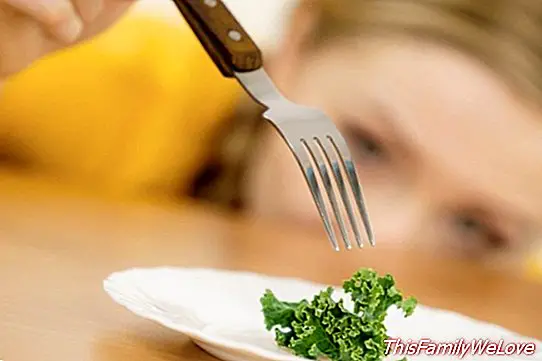Anorexia: the problem of lack of food

People with anorexy and bulimia present some psychological and psychiatric conditioning factors that, in an environment where thinness is desired, can lead to a anorexia or bulimia.
Nine out of ten affected by anorexia and bulimia are women who, victims of this disorder, perceive certain parts of their body distorted. Above all, abdomen, hips, buttocks and thighs are much larger than real size.
Eat Healthy
According to Dr. Fernando Villasmil, Head of Endocrinology and Nutrition at the Virgen del Rocío University Hospital in Seville, "the majority of the population suffers from eating disorders." You only have to look at the content of the shopping carts when you check out of the supermarkets: they are full of adulterated foods ".
Often, we identify a healthy diet with a diet low in fat and calories, but experts insist that everything should be eaten in a balanced way, and, once again, consider the Mediterranean diet as the star of nutrition. To all those who may have forgotten, but especially to young people, the specialist in Nutritional Education Consuelo López Nomdedeu, directs the following recommendations:
- Water is the drink par excellence.
-All foods take place in the diet.
- If you do not eat with the family, we must dedicate a reasonable time to the food and share this moment with friends, so that it constitutes a real rest.
- A balanced diet in childhood and youth represents an investment for the future and security for the present. Eating well does not mean eating much or expensive.
- Recover the gastronomic heritage of our elders can produce pleasant surprises.
- Spain has one of the best pantries in Europe, it is not necessary to look for strange solutions to eat well.
- On food, it is necessary to develop a critical judgment.
Believe it or not, anorexia is not a disease now
- Anorexia exists since ancient times. Already in the Arab world there are references to this disease, such as, for example, Avicenna's description of the case of the young prince Hamadham, who is dying because of refusing to eat, prisoner of an intense melancholy.
- Purging behaviors they have known each other since ancient times: in the Roman civilization, vomiting was used to empty the stomach and continue eating uncontrollably.
- Even though a 19-year-old girl eats about 12% less that what he ate at age 10, his fat reserves increase. In contrast, a 19 year old consumes a fifth more food and does not gain proportionally, because it invests those calories in the energy your muscle needs.
- More than half of the Spanish population between 14 and 24 years of age with residence in cities of more than 50,000 inhabitants - the sector with the highest prevalence of eating disorders (ACT) - confesses interested in publications related to weight and weight loss and follows with attention the advertising of slimming products. In addition, 35% are "on a diet" and 45% perform physical exercise to reduce body volume.
- One in two Spanish girls aged 15 and 16 think they weigh too much. Each spring, two million young people start a diet in Spain. Several months later, a part of them will suffer some type of eating disorder (ACT).
Prevent anorexia in the family
In her article "Psychosocial intervention in eating disorders", sisters Pilar and Patricia Casasús, clinical sociologists and psychologists respectively, stress the importance of parent / child communication in order to establish preventive guidelines for eating disorders ( TCA). The two specialists propose a series of strategies to stimulate this communication:
1. Expression of negative feelings. The expression of negative feelings should not cause rejection or deteriorate family relationships, but should invite children to explain what they feel and the reason that causes it in the first person. Likewise, we must propose shared solutions to avoid feeling the same in the future.
2. Strengthening self-esteem. To the extent that this is a risk factor for the development of ACT, it is convenient to strengthen it by trying to magnify the scope of small or large goals and to minimize errors or failures. It is also advisable to avoid comparisons between siblings.
3. Active listening. Learning to listen to who speaks to us and to be tolerant does not mean that a family has inconsistent standards of education. Understanding the needs of children and trying to "negotiate" with them is a skill that is learned. On the contrary, a family that is based on punishment and threat to achieve its objectives, only gets an atmosphere of hostility, fear, sadness and a feeling of inferiority.
4. Family support. If the person feels supported by his parents and has sufficient self-esteem, he will solve with more success the problems that arise during his socialization.
5. Greater involvement in food education. To do this, it is recommended that at least one meal a day be made with the family, trying to create a relaxed and cordial atmosphere during this time, so that the experience will please the children.
6. Vulnerability factors. Parents must know these factors (age, sex, previous obesity, practice of ballet or certain sports, etc.), to be able to get ahead and inform their children about the nature and dangers of prejudice against the body. Nor should we convey the false idea that success is linked to beauty and not encourage the adoption of diets, except prescription.
Marisol Nuevo Espín
Advice: Doctor Villasmil, Head of Endocrinology and Nutrition at the Virgen del Rocío University Hospital in Seville and Head of the Anorexia Unit




